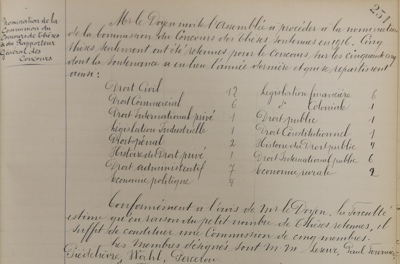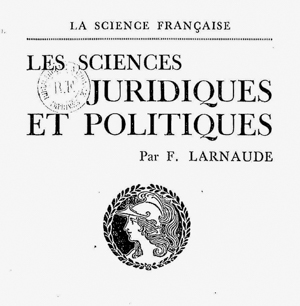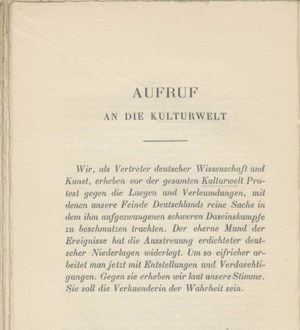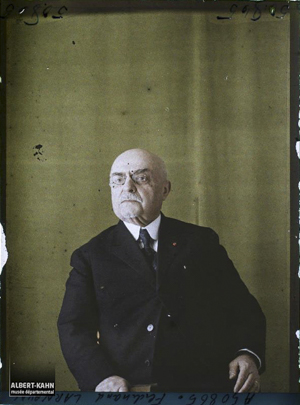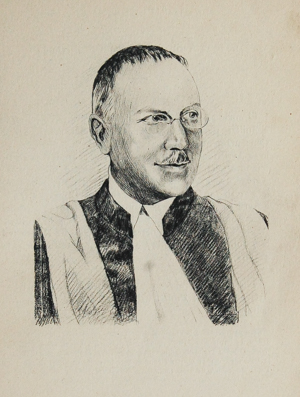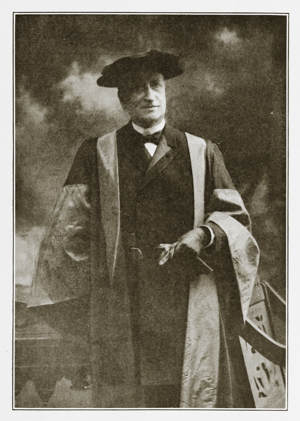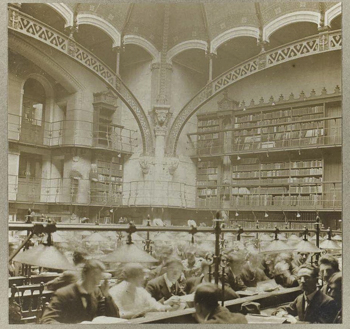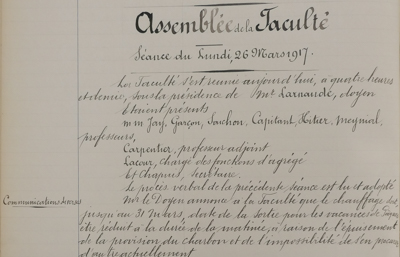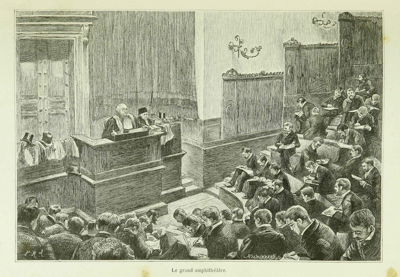The First World War was a pivotal moment for the Paris Faculty of Law. As the largest law school in France, it soon had to deal with an exceptional situation that deprived it of part of its students and professors. Under the impetus of its dean, Ferdinand Larnaude, the faculty was put at the service of France’s war against Germany, an intellectual struggle of law against force that enrolled both professors and students. War against the Paris Faculty of Law : the transformations of education The declaration of war in August 1914 surprised the faculty during the end of the examination period and upset the start of the academic year 1914-1915. Student numbers dropped throughout the war. Several teachers, of an age to be mobilized by the army,pour lire la suite…
Tag: Paris
Legal propaganda in the Great War : the example of Ferdinand Larnaude’s Sciences juridiques et politiques [Legal and Political Sciences] (1915)
In 1915, the World’s Fair left the Old Continent for the United States ; this was not a first, since Philadelphia, Chicago and St. Louis had already hosted this event before. Recovering from the terrible earthquake of 1906, the city of San Francisco was this time chosen to receive the exhibitors of the twenty-four participating countries ; between March and December 1915, it would welcome about nineteen million visitors. The event, as always, revolved around a major theme. For this iteration, it was the Panama Canal, completed and inaugurated a year earlier, that was in the spotlight : the exhibition was renamed “Panama- Pacific” for the occasion. Indeed, this canal, whose titanic work began in 1882, allowed an unprecedented expansion of maritime trade and contributed to the strongpour lire la suite…
The Paris Faculty of Law denounces the violation of the law of nations by Germany
From the beginning of the Great War, the professors of the Paris Faculty of Law denounced the “violation de tous les principes [violation of all the principles]” of the law of nations by the Germans, in particular the attack on the neutrality of Belgium which was guaranteed by treaties to which Prussia had subscribed. Didn’t Chancellor Bethmann-Hollweg, “descendant d’un des professeurs de droit les plus connus de l’Allemagne [descendant of one of Germany’s best-known law professors]” (Moritz Bethmann-Hollweg, one of Savigny’s students) say that “les traités ne sont que des chiffons de papier [treaties are nothing but scraps of paper]” ? This “parole impie [unholy word]” was recalled by Dean Larnaude in his speech to his colleagues on 7 November 1914 on the eve of thepour lire la suite…
Dean Larnaude’s speeches
In its 1900 issue, the Revue internationale de l’enseignement [International Review of Education](IRE) transcribed a speech delivered by Dean Ernest Glasson (1899-1906 deanship) on the occasion of the presentation of the prizes of the Faculty of Law. The statement on the development of teaching in the Paris Faculty of Law in the nineteenth century concludes with the prospects of a hoped-for future for the institution : ” Que notre chère École continue sans interruption sa marche progressive, et que pendant ce vingtième siècle qui sera peut-être une époque de luttes formidables, elle reste, par la fermeté inébranlable de ses doctrines, un des représentants de la science les plus autorisés du Droit contre les abus de la force. Que la France remplisse sa mission en s’inspirant de l’esprit moderne, sanspour lire la suite…
Professor Geouffre de La Pradelle in America (1914-1917)
The act of violation of the neutrality of Belgium and Luxembourg, committed by Germany in the first days of August 1914, has powerfully helped shape a representation of the conflict in which France and its allies might pose as virtuous champions of the law threatened by German barbarism. But it also had the paradoxical effect of placing neutral countries at the heart of a confrontation in which they refused to enter militarily. For Germany’s offhand attitude towards two states benefiting from such status, recognized and protected by international treaties which it had itself ratified, and its contempt for those treaties, reduced to the rank of “scraps of paper” by Chancellor Bethmann-Hollweg, were not only a radical challenge to the emerging discipline that was then internationalpour lire la suite…
Louis Renault : legitimizing international law in France
This bookseller’s son, born in 1843, went to law school in Paris and graduated in 1861. Professor of Roman law and commercial law at the University of Dijon (the latter field also being that of his colleague Charles Lyon-Caen, also born in 1843, with whom he co-authored a book), he replaced Charles Giraud for the course on the law of Nations at the Faculty of Paris, before succeeding him in 1888. He also taught at the new École libre des sciences politiques, which was a breeding ground for French internationalists. A jurisconsult at the Ministry of Foreign affairs on the Quai d’Orsay since 1890, the representative of France at the Hague peace conferences of 1899 and 1907, member of the Institute of International Law sincepour lire la suite…
The library of the Paris Faculty of Law in the Great War
At the beginning of August 1914, when war broke out, the library of the Faculty of Law of Paris was a well-established and ever-expanding institution (by comparison, see the article on the library of Toulouse). Its development had begun thirty-eight years earlier, starting in 1876, with the appointment of its first professional librarian, Paul Viollet. Reflecting a desire to move the structure out of its embryonic state, this appointment was accompanied by architectural construction, an increase in budget and an increase in the number of staff members. Thus, between 1876 and 1914, under the leadership and direction of Viollet, the library grew from 20 to nearly 300 seats, from 15,000 to 112,000 books, from a few dozen to about 600 periodical subscriptions, from two topour lire la suite…
Daily life in the Paris Faculty of Law during the war
“In the life of a faculty, as in that of a family, events repeat themselves, almost always the same, which are the most numerous and the most necessary. Sometimes new events occur, bringing about a modification, small or large, in their organization and operation. Those are necessary as well, but they must not be too frequent, lest they bring about too great an instability into an existence whose continuity and regularity are, in a way, the fundamental principle. The life of bodies, as that of families thus includes happy and unhappy events alike. Would it really be life otherwise ?” ; these remarks were expressed by Dean Ferdinand Larnaude in 1921, in the annual report on higher education institutions of the Paris Academy (law school). Larnaude, whopour lire la suite…
Toulouse and Paris : the ties of competing law schools
Paris and Toulouse are the two most important law schools in France. Throughout the 19th century, they dominated the French academic landscape, notably by their attractiveness, their enrollment numbers and the degrees they awarded. They and a dozen other legal faculties on the territory created by Napoleon from as early as 1804 shared the same professionalization objective : they organized examinations and delivered the titles necessary for the practice of legal and judicial professions (magistrates, lawyers, teachers, etc.) to children of the most privileged classes. Everywhere, education was focused on civil law, Roman law and procedural law. Little to no provision was made for other branches of law (administrative law, commercial law or legal history). The contemporaries, among whom some famous writers (Balzac, Zola and others),pour lire la suite…

